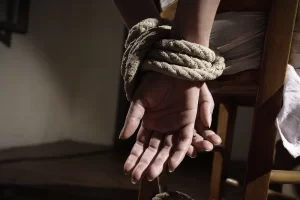a small firm that packs a big punch
- Home
- Attorneys
- Articles
- Practice Areas
- Family Law
- Criminal Defense
- Employment Law
- Personal Injury
- Workers’ Compensation
- Real Estate
- Wills, Trusts & Estates
- Blog
- Courts We Serve
- Contact
- Toggle website search
 Passaic County’s Prevention of Domestic Violence Act protects married couples, domestic partners, individuals in dating relationships, and those in parent and child relationships against a variety of criminal offenses subsumed within the classification of “domestic violence.” When a domestic violence incident occurs and law enforcement is called to the scene, two distinct legal actions may commence. First, the individual accused of an act of domestic violence may be charged criminally with an offense such as assault, harassment, or terroristic threats. Second, the victim may elect to file a restraining order against the alleged abuser, which will result in a separate legal proceeding in New Jersey Family Court. Often, domestic violence arises in the context of divorce, as tensions run high between formerly married couples. When these instances occur, the stakes in domestic violence proceedings are even higher, as a finding of guilt in a criminal case or the implementation of a final restraining order can spell negative implications for child custody arrangements.
Passaic County’s Prevention of Domestic Violence Act protects married couples, domestic partners, individuals in dating relationships, and those in parent and child relationships against a variety of criminal offenses subsumed within the classification of “domestic violence.” When a domestic violence incident occurs and law enforcement is called to the scene, two distinct legal actions may commence. First, the individual accused of an act of domestic violence may be charged criminally with an offense such as assault, harassment, or terroristic threats. Second, the victim may elect to file a restraining order against the alleged abuser, which will result in a separate legal proceeding in New Jersey Family Court. Often, domestic violence arises in the context of divorce, as tensions run high between formerly married couples. When these instances occur, the stakes in domestic violence proceedings are even higher, as a finding of guilt in a criminal case or the implementation of a final restraining order can spell negative implications for child custody arrangements.
Regardless of the circumstances of your domestic violence case, the damage of an unfavorable outcome can be catastrophic and long-lasting. For the victim or the accused, it is essential to have an experienced domestic violence attorney to protect your rights and advocate on your behalf. At The Montanari Law Group, our seasoned attorneys have provided aggressive representation for countless clients in Wayne, Clifton, Little Falls, and throughout Passaic and Essex counties. Our team includes leaders in the fields of Criminal and Civil law, and our integrated approach allows us to address every component of your case to arrive at a favorable outcome. We will meet with you to learn about your situation, conduct an independent investigation, and construct a compelling case in your favor. It is our mission to provide support and guidance through every phase of the legal process as we work tirelessly to achieve the best possible outcome. For a free initial consultation with one of our knowledgeable domestic violence attorneys today, contact our Passaic County offices at 973-233-4396 or toll-free at 888-877-7985.
 Domestic assault may be charged as a misdemeanor or felony. A conviction on your record carries a permanent stigma of being guilty of a violent crime. If you have been arrested and are facing domestic assault charges, you can’t afford to hope for the best. You are in serious trouble, and you need serious help.
Domestic assault may be charged as a misdemeanor or felony. A conviction on your record carries a permanent stigma of being guilty of a violent crime. If you have been arrested and are facing domestic assault charges, you can’t afford to hope for the best. You are in serious trouble, and you need serious help.
Along with a domestic assault charge, you are likely to have a restraining order or no-contact order placed against you. You will not be able to return to your home or see your children. A domestic injunction puts you at an immediate disadvantage when defending yourself against criminal assault charges. It is important to act quickly to hire an experienced attorney to begin protecting your rights immediately.
In 1991, New Jersey lawmakers enacted the Prevention of Domestic Violence Act, to provide protection for domestic violence victims and to outline the guidelines for legal procedures surrounding domestic violence and restraining orders in New Jersey. According to this law, any of the criminal offenses listed below may be considered an act of domestic violence if it arises between individuals who meet the relationship criteria.
The relationship must be one of the following: marriage, separation, divorce, currently or formerly sharing a residence, currently or previously in a dating relationship, or individuals who share a child or who are expecting a child together. The victim and the defendant must be 18 or older or must be an emancipated minor.
The following acts are considered domestic violence: homicide, assault, terroristic threats, kidnapping, criminal restraint, false imprisonment, sexual assault, criminal sexual contact, lewdness, criminal mischief, burglary, criminal trespass, harassment, or stalking. When any of these events allegedly occurs, the victim can file criminal charges, a restraining order, or both. If a victim chooses not to file a restraining order, a law enforcement officer can file one on his or her behalf.
If a temporary restraining order is issued, a final restraining order hearing must be held within 10 days. During this time, the temporary restraining order will bar the defendant from having any contact with the alleged victim. Depending on the circumstances, the may also be removed from the home and prevented from seeing his or her children. Both the victim and the defendant need to thoroughly prepare their case for the final restraining order hearing. Due to the complexity of these proceedings, it is highly advisable to seek representation from an experienced attorney.
 Statistics indicate that many domestic violence victims are pregnant women, and there is a positive correlation between spousal abuse and child abuse. Even when children are not, themselves, abused, but witness the domestic violence of a parent, it causes strong and lasting emotional effects. At Del Saro & Montanari, your well-being is important to us. Let us assist you during this difficult time as you deal with such a heavy burden. Your unique situation should be taken care of by professionals.
Statistics indicate that many domestic violence victims are pregnant women, and there is a positive correlation between spousal abuse and child abuse. Even when children are not, themselves, abused, but witness the domestic violence of a parent, it causes strong and lasting emotional effects. At Del Saro & Montanari, your well-being is important to us. Let us assist you during this difficult time as you deal with such a heavy burden. Your unique situation should be taken care of by professionals.
Frequently, in domestic violence cases, a temporary restraining order or a final restraining order is involved. According to The Prevention of Domestic Violence Act, if a restraining order is filed in New Jersey, the two parties cannot live under the same roof under any circumstances.
Although the Act does not specifically state that the defendant is the person who has to exit the premises, generally, the victim is permitted to remain in the home. However, it is worth noting that the statute merely prohibits an in-house presence by both parties. Thus, if the victim can go elsewhere, the defendant may be permitted to remain in the home. Regardless of the language and the statutory requirement, the alleged abuser is obligated to leave the residence if he/she was arrested for the charge of domestic violence.
If you are in the unfortunate position where you are commanded to leave your home after an alleged domestic violence incident, you are permitted to gather any personal belongings with the assistance of a police escort, as long as you were not arrested for any dispute. If you are unable to take any belongings upon being notified of the order or you need to gather additional items, you may ask the Court to return to your home to retrieve other personal items. Usually, the Judge will set a specific date and amount of time to return to the home. The individual will also be responsible for securing assistance from the local police to escort him or her while they gather their belongings. The victim must leave the premises while this takes place.
 If you are the alleged victim and allowed to remain in the home, the court is authorized to order other forms of relief in addition to the defendant vacating the premises, mostly in the form of economic assistance such as child support, partial rent payments, use of the family car, etc. Any attempt by the alleged abuser to contact the victim regarding these decisions made by the Judge goes against the TRO (temporary restraining order) and can have serious consequences.
If you are the alleged victim and allowed to remain in the home, the court is authorized to order other forms of relief in addition to the defendant vacating the premises, mostly in the form of economic assistance such as child support, partial rent payments, use of the family car, etc. Any attempt by the alleged abuser to contact the victim regarding these decisions made by the Judge goes against the TRO (temporary restraining order) and can have serious consequences.
Similar rules apply if a final restraining order is issued in your case. Specifically, the two parties are not allowed to live together under the same roof. Since a restraining order cannot be removed without another formal legal proceeding, this rule is in place permanently. The judge has the discretion during the final hearing to order the exact requirements in your case, meaning who must leave home and whether any forms of relief should be issued.
Once a domestic violence restraining order has been issued, violating the order is a serious offense. Violations of domestic violence restraining orders can potentially be prosecuted as fourth-degree indictable offenses, and violators can be convicted regardless of whether or not the underlying allegations of domestic violence are ultimately proven to be accurate.
When domestic violence occurs in New Jersey family homes, victims may file for both temporary and final restraining orders. Temporary restraining orders are often granted with little or no evidence with the intention of providing immediate protection for the victims. As a consequence, temporary restraining orders are not heavily considered for child custody issues.
However, final restraining orders will require a court hearing where a judge will determine whether the evidence at hand is sufficient to grant a Final Restraining Order (FRO). An issued FRO will often carry stipulations against the domestic violence offender including limited or prohibited contact between the offender and the victims, meaning things like a divorce’s child custody agreement or any kind of post-divorce child custody modification matter can be seriously impacted by the existence of a FRO.
Orders that are issued by a judge limit or restrict access of an abuser to their victim. To protect the victim from the offender, the court may issue a temporary restraining order (TRO) while the charges are pending before a final restraining order (FRO) can be issued. A temporary restraining order can include actions such as:
 Forbiddance of making contact in person, via relatives, via electronic communication, telephone, or in writing, or through a third party on the abuser’s behalf.
Forbiddance of making contact in person, via relatives, via electronic communication, telephone, or in writing, or through a third party on the abuser’s behalf.A temporary restraining order typically lasts for 10 days and can be filed without the defendant there in the court. An FRO or final restraining order requires that both parties appear, and it has no expiry date. An FRO can only be removed by a Judge. Many of the items in an FRO are similar to those in a TRO.
Domestic violence occurs in all kinds of relationships – no matter your age, financial status, race, or sexual orientation.
Domestic violence is a prevalent issue in New Jersey. It affects thousands of people each year; according to the most recent available data by the New Jersey State Police, over 63,000 cases of domestic violence were reported in 2016.
If a parent has been found guilty of domestic violence through the FRO process, that is an official judgment which will be heavily considered within any child custody hearing. It is possible that due to the nature of this previous domestic abuse, the offender may have their parenting time and child custody reduced, and in more extreme cases even denied entirely.
When ruling on any kind of child custody or parenting time matter involving a question of domestic violence, Passaic County family courts may take the following factors into account:
Child custody hearings involving domestic violence are highly complex legal and personal matters. Judges may attempt to keep the custody rights of both parents with additional guidelines such as parenting classes, domestic violence therapy, or anger management therapy. However, they do also have the right to deny parenting time and child custody outright based on a history of domestic violence if they believe it is in the children’s best interests to do so.
If you are facing any kind of child custody or parenting time decision involving incidents of domestic violence, rely on our Passaic County child custody attorneys to protect your legal rights.
In the situation where a parent falsely accused another parent of domestic violence, that may also carry weight when determining child custody and parenting time. False accusations of such a serious magnitude are a form of parental alienation. This means that not only will the accused parent be affected by these harmful lies, but the child may also be unduly influenced into having negative feelings towards the innocent parent.
Family Court judges will consider false accusations of any kind as a serious stain upon the accusing parent’s character and judgment. Ultimately, child custody hearings are meant to provide for the best interests of the children. If a parent is dishonest and/or vindictive enough to take such drastic measures, he or she may not be a mentally fit parent. Depending on the nature of the accusations and other relevant factors, the parent who falsely accused another parent of domestic abuse may have their child custody rights limited or even denied.
According to the United States Department of Justice, domestic violence is the use of abusive behavior to gain or maintain control over a partner. The Department specifies patterns or behaviors that are “physical, sexual, emotional, economic, or psychological” in nature. Therefore, there are multiple different forms of domestic violence – New Jersey law outlines nineteen forms of domestic violence that are viewed as criminal offenses. The forms of domestic violence as named in the Prevention of Domestic Violence Act of 1991 are
 ssault
ssault sexual assault
sexual assaultDomestic violence occurs in all kinds of relationships – no matter your age, financial status, race, or sexual orientation. People of at least 18 years of age or emancipated minors are protected by the Prevention of Domestic Violence Act and can seek a Temporary Restraining Order as well as press criminal charges if they are the victims of violence in the home. Domestic violence pertains to any of the above acts that are committed by someone with whom the victim has a child, someone with whom the victim is expecting a child (one is pregnant), or someone with whom the victim has been in a dating or matrimonial relationship.
An emancipated minor is considered someone who is under the age of 18 but has been married, enrolled in military service, been pregnant, had a child, or been declared by a state administrator to be emancipated.
A domestic violence charge involves both criminal and civil law. When a temporary restraining order (TRO) is filed as a result of domestic abuse, the defendant must appear before a Superior Court: Family Part judge for a hearing to determine whether that restraining order will be converted into a Final Restraining Order (FRO). During this case, one does not have the same protections that are afforded during a criminal trial. For example, the standards are lower, and the defendant is not entitled to a presentation before a jury.
 Victims of domestic violence can be someone of varying relation to the abuser according to New Jersey law:
Victims of domestic violence can be someone of varying relation to the abuser according to New Jersey law:
There are two types of custody that are taken into consideration during a custody hearing: physical custody and legal custody. A child lives with the parent(s) given physical custody, and those parents are responsible for meeting the basic daily needs of the child. A parent given legal custody has the right to share in the process of making decisions that affect the child, such as where the child will attend school and what medical care the child will receive.
There are, of course, numerous considerations a judge takes into account during a child custody hearing, not the least of which is whether domestic violence was present in the home, and the directness of its effect on the child. The main considerations a judge includes in their review of who is fit for legal and physical custody are
A judge is required to consider domestic violence history as a key factor in the child custody proceeding.
A judge determines what visitation a parent who is not given physical custody of the child may have. If there has been a history of domestic violence, it is likely that a judge will order supervised visits or restrict overnight visits. The judge may also order that the abusive parent complete therapy before being allowed visitation rights with or without supervision.
If you have been the victim of domestic violence, you can protect yourself by filing a civil complaint with the New Jersey Superior Court: Family Part under the Prevention of Domestic Violence Act of 1991. You also have the right to file a criminal complaint, which would punish the abuser for their actions (whereas a civil complaint is filed specifically for your protection). In response to the filing of the civil complaint, a judge may grant a Temporary Restraining Order.
 A TRO ensures that the abuser may not return to the scene of the reported act of domestic violence or specified other locations determined by the judge, in service of the victim’s safety. A TRO would also prevent the abuser from a number of actions, including possessing a weapon, contacting the victim, or conducting any future acts of domestic violence. If a TRO is issued, the perpetrator must pay temporary child support, if applicable, and pay for any medical expenses that the victim incurred due to the violent act.
A TRO ensures that the abuser may not return to the scene of the reported act of domestic violence or specified other locations determined by the judge, in service of the victim’s safety. A TRO would also prevent the abuser from a number of actions, including possessing a weapon, contacting the victim, or conducting any future acts of domestic violence. If a TRO is issued, the perpetrator must pay temporary child support, if applicable, and pay for any medical expenses that the victim incurred due to the violent act.
In order to file a civil complaint, contact your Superior Court: Family Part or, after hours, report to your local police department.
After a TRO is issued, the Superior Court: Family Part will schedule a Final Restraining Order hearing. Both parties are required to attend this hearing, during which the judge will hear testimony from both sides. If the judge sees fit, an FRO will be filed.
When a FRO is issued, the trajectory of one’s entire life can be affected. An FRO can impact one’s capacity to travel outside of the state or internationally. It can also exclude you from eligibility from certain jobs.
To speak with one of our seasoned Passaic County domestic violence attorneys, contact us today at 973-233-4396 or toll-free at 888-877-7985 for a free initial consultation. Your time is limited, so it is best to begin formulating your case as soon as possible.